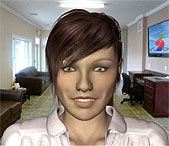SPEECH-INTERACTIVE AVATARS and USER INTERFACE DESIGN
ARCHIVE ONLY 1997 - 2012 EXAMPLES
![]()
HISTORICAL REFERENCE ONLY - ARCHIVE ONLY
What we do in creating human interaction in 3D Worlds:
We create humanoid CG avatars with speech capabilities for real-time speech interaction with humans with computers, kiosks, mobile, in 2D or 3D, and according to client's photorealistic or stylized preferences.
Speech interaction with avatar guides, friends, teachers, or playmates is already here and cross-platform applications are being developed for kiosk and mobile, home and away.
We are available for consultation, design or production on speech-interactive user interfaces and 3D avatars for demo, display or product development. We have designed 3D avatars for speech-interactive 3D scenarios for corporate and art clients, as proof-of-concept demo or as works of media art.
Artificial intelligence and the 'look':
How 'smart' and engaging your avatar depends on you, the client. Low budget solutions produce lower intelligence, and vice versa. The look, the scene and the script is at your discretion and dependent on our capabilities. We enter into a contract with you which is described in stages / milestones. If you want a 'turnkey solution' and prefer to leave design and implementation of general content up to us, then we can do that too.
Web and 3D culture has moved to more interactive and communicative
forms:
Typing to communicate and reading text (as you are now) is certainly 'old school' and certainly not as pleasant or efficient as talking between ourselves. Natural language speech interaction with humanoid figures ('avatars` of all kinds of shape, race, gender, age and appearance) is a `natural` in the interactive web as well as computer communications for education, medicine, banking, arts, entertainment and gaming. Whether it be for home, kiosk, or mobile apps, interactive speech recognition avatars are here to stay, at least for those who would like something more than 'typing' or looking for a keyboard amidst all your other apps and touch screen items.
What is required:
Speech-recognition software, provided by client or using our previously licensed demo SR software, is required for all speech-interactive projects. Simple configurations of displays with microphone/speakers or head-sets are also required, as is normal for all speech software. The content is delivered in real-time and 'face to face' or however the human speaker determines.
Our design teams are constituted on a contract basis and tailored to the intended project. The Project Lead Al Razutis has years of production expertise which includes 3D animation, speech-interaction for demo and web, and award-winning creations in stereoscopic 3D, motion-pictures, and VR worlds.
Our
workflow can range from custom-built avatar to pre-designed
avatar solutions. We utilize a number of 3D character modeling and
animation softwares in the creation of full body animated avatars,
with facial and lip sync animation, as per client's scripted requirements.
We will taylor our output to conform with client's provided 'A.I'
database< and speech-engine platform requirements. From custom to pre-designed,
from photo-realistic to 2D characters, the range is wide open to the
client's creative interests.
Avatars we've done (a brief and incomplete selection):
![]()
Speech - Interaction Demos - Short Video Clips for the Web
User 'speaking' interaction is assumed in responses to avatar
|
All video is .WMV (Win Media Player) - 1-4 mB download : Web-resolution demo samples speech animation - no interaction in these web samples:
'Sally' and 'Lisa' by Al Razutis 2009 Web-resolution demo
samples speech animation: Web-resolution demo
samples speech animation: Contact
Al
Razutis directly with your requirements or to discuss viewing full-demo versions of selected works (NDA required). Looking back at speech-interaction for the web:Speech-interaction graphical interfaces (you are talking, not typing or employing pointers) are inevitable for game and other applications like web browsing, chat, entertainment, security, remote control, medicine, e-learning. Issuing voice commands (or speaking) is more 'human interactive' than punching hotkeys to generate actions. Conversing with a interactive avatar (CG humanoid) is more 'social' than typing (as in above, right). We like to chat, meet people, engage in 'relationships', real and virtual . Human interaction is typified by conversations with other humans, and speech-recognition (SR) makes web simulations with avatar-humanoids a two-way conversation. But not like the 'old school:
We make 3D Avatars speaking natural languageWe make 3D avatars that respond in natural language, gesture, expression and some other things that make conversations 'real' and engaging. For the http web, a speech-enabled browser environment is required to support the speaking user interacting with web content. The major choices out there (in the marketplace) are dominated by 'speech to text' functionalities which focus on 'document' or navigation of content. Our focus is on the creationg of speech-interactive 'worlds' populated by 'intelligent' avatars which are employed for the purposes of education, information gathering, commerce, entertainment and the arts, whichever is appropriate. About avatars - face mapping - speech interaction:
Where avatars come from:The avatars referred to here are generated as 3D models (files) in computers and are displayed on monitor screens (or in 3D viewing environments). The CG content is accessed for viewing either on line or by local (drive) access. This can be done in 2D. 3D, 3DS, and/or 'holographically' (which is coming). The term 'avatar' refers to humanoid shapes that aquire a 'personality' through the use of anthropomorphic shapes and subjects (human body and face, clothing, settings, etc.). What that 'human' may be, of course, is up to you and the process it takes to get there.
Whether the avatar is 'realistic' (with photo texture maps) or synthetic-modeled with an assortment of possibilities in skin, texture, face and body features is up to you. Both extremes have to be handled with care, and everywhere 'in between' is preferred. The speech-interactive scenario is based on embedded speech to text (code) functions of the browser-enabled speech engine to activate specific avatar (humanoid) speech responses or linked web content (response). The avatar exists in a library (database) of available responses; the recognition of user input is based on a grammar - syntax determined by the Speech Engine, and an intelligent (A.I.) back-end that 'recognizes' the user in terms of a unique history of personal parameters and interests. In this capacity, the speech-recognition capabilities of the browser environment (if that is the desired delivery system) must be accurate and timely in both recognition and avatar response.
Avatar appearance can be modified to include viewer choices and inputs. The taking on of pre-determined 'characters' and 'character forms' is well known in virtual reality group sites. In our work, the avatar face can be a 'self-portrait', an 'alter-ego', a made up character, or whatever the client suggests, or is possible. The avatar can be photo-realistic or stylized characature, photo-based or CGI synthetic In market-driven projects which rely on popularity and return of investment, the 'generic' quickly becomes outdated. The market will discard a poorly performing (robotic, predictable, generic) avatar, however intricate or complex the software design. Many projects that did not incorporate effective (artistic) graphic design have gone into the marketplace trash bin. And that is one of the reasons 'it has taken so long'. Today's focus on portable browsing devices, freedom from keyboard and mouse, make speech-interactive avatar development all the more relevant. It is rather astounding that major players such as Microsoft, and game publishers, have not refined and shipped functioning SR avatar packages along with their software. The opportunity is there for the individual entrepreneur or start-up to realize this vision and its future. Useful links:
VR Home ('Virtual Reality on the Web') |




